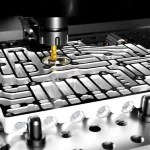Another way of classifying production activity is according to the quantity of product made. In this classification, there are three types of production:
1. Job shop production
2. Batch production
3. Mass production
1.Job shop production.
The distinguishing feature of job shop production is low volume. The manufacturing lot sizes are small, often one of a kind. Job shop production is commonly used to meet specific customer orders, and there is a great variety in the type of work the plant must do. Therefore, the production equipment must be flexible and general-purpose to allow for this variety of work. Also, the skill level of job shop workers must be relatively high so that they can perform a range of different work assignments. Examples of products manufactured in a job shop include space vehicles, aircraft, machine tools, special tools and equipment, and prototypes of future products. Construction work and shipbuilding are not normally identified with the job shop category, even though the quantities are in the appropriate range. Although these two activities involve the transformation of raw materials into finished products, the work is not performed in a factory.
2. Batch production:
This category involves the manufacture of medium-sized lots of the same item or product. The lots may be produced only once, or they may be produced at regular intervals. The purpose of batch production is often to satisfy continuous customer demand for an item. However, the plant is capable of a production rate that exceeds the demand rate. Therefore, the shop produces to build up an inventory of the item. Then it changes over to other orders. When the stock of the first item becomes depleted, production is repeated to build up the inventory again. The manufacturing equipment used in batch production is general-purpose but designed for higher rates of production. Examples of items made in batch-type shops include industrial equipment, furniture, textbooks, and component parts for many assembled consumer products (household appliances, lawn mowers, etc.). Batch production plants include machine shops, casting foundries, plastic molding factories, and press working shops. Some types of chemical plants are also in this general category.
3. Mass production:
This is the continuous specialized manufacture of identical products. Mass production is characterized by very high production rates, equipment that is completely dedicated to the manufacture of a particular product, and very high demand rates for the product. Not only is the equipment dedicated to one product, but the entire plant is often designed for the exclusive purpose of producing the particular product. The equipment is special-purpose rather than general-purpose. The investment in machines and specialized tooling is high. In a sense, the production skill has been transferred from the operator to the machine. Consequently, the skill level of labour in a mass production plant tends to be lower than in a batch plant or job shop.


